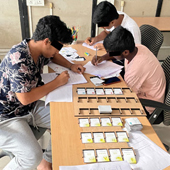References:
Publications:
• Piaget, J. (1964). Cognitive development in children:
Piaget.Journal of research in science teaching, 2(3), 176-186.
• Piaget, J. (2013). Play, dreams and imitation in childhood (Vol. 25). Routledge.
• Kudrowitz, Barry & Wallace, David. (2010). The play pyramid: A play classification and ideation tool for toy design. Int. J. Arts and Technology. 3. 10.1504/IJART.2010.030492.
• Cynthia C. Selby. 2015. Relationships: computational thinking, pedagogy of programming, and Bloom's Taxonomy. In Proceedings of the Workshop in Primary and Secondary Computing Education (WiPSCE '15). Association for Computing Machinery, New York, NY, USA, 80–87.
DOI: https://doi.org/10.1145/2818314.2818315
• Ting-Chia Hsu, Shao-Chen Chang, Yu-Ting Hung, How to learn and how to teach computational thinking: Suggestions based on a review of the literature, Computers & Education, Volume 126, 2018, Pages 296-310, ISSN 0360-1315,
https://doi.org/10.1016/j.compedu.2018.07.004
• Basawapatna, Ashok & Kyu, Han & Koh, Kyu Han & Repenning, Alexander & Webb, David & Marshall, Krista. (2011). Recognizing computational thinking patterns. SIGCSE'11 - Proceedings of the 42nd ACM Technical Symposium on Computer Science Education. 10.1145/1953163.1953241.
• Prensky, M.: Digital game-based learning. McGraw-Hill, New York (2001)
• “Developing Computational Thinking in Compulsory Education” by the Joint Research Centre (JRC), the European Commission’s science and knowledge service.
https://publications.jrc.ec.europa.eu/repository/bitstream/JRC104188/jrc104188_computhinkreport.pdf
• Dsource: Designing for Children - Play and Learn: Caillois’s Attitudes in Play Experience
https://www.dsource.in/course/designing-children-play-and-learn/play-theories-and-design/csikszentmihalyi%E2%80%99s-flow-theory
• Dsource: Designing for Children - Play and Learn: Csikszentmihalyi’s Flow Theory
https://www.dsource.in/course/designing-children-play-and-learn/play-theories-and-desig /caillois%E2%80%99s-attitudes-play
• Dsource: Designing for Children - Play and Learn: Piaget’s Theory of Cognitive Development
https://www.dsource.in/course/designing-children-play-andlearn/learning-theories-and-design/piaget%E2%80%99s-theory-cognitive
• Kelly, N., & Gero, J. (2021). Design thinking and computational thinking: A dual process model for addressing design problems. Design Science, 7, E8. doi:10.1017/dsj.2021.7
• Hunicke, Robin & Leblanc, Marc & Zubek, Robert. (2004).
MDA: A Formal Approach to Game Design and Game Research.
AAAI Workshop - Technical Report. 1.
https://www.researchgate.net/publication/228884866_MDA_A_Formal_Approach_to_Game_Design_and_Game_Research
• Ferdig, Richard & Winn, Brian. (2009). The Design, Play, and
Experience Framework. 10.4018/978-1-59904-808-6.ch058.
https://www.researchgate.net/publication/314280472_The_Design_Play_and_Experience_Framework
• Petri, Giani & Gresse von Wangenheim, Christiane & Borgatto, Adriano. (2018). MEEGA+: A Method for the Evaluation of Educational Games for Computing Education.
https://www.researchgate.net/publication/326722665_MEEGA_A_Method_for_the_Evaluation_of_Educational_Games_for_Computing_Education
• Tsarava, K., Moeller, K., & Ninaus, M. (2018). Training Computational Thinking through board games: The case of Crabs & Turtles. International Journal of Serious Games, 5(2), 25–44.
https://doi.org/10.17083/ijsg.v5i2.248
• Panagiotis Apostolellis, Michael Stewart, Chris Frisina, and Dennis Kafura. 2014. RaBit EscAPE: a board game for computational thinking. In Proceedings of the 2014 conference on Interaction design and children (IDC '14). Association for Computing Machinery, New York, NY, USA, 349–352.
https://doi.org/10.1145/2593968.2610489
Other Links:
• Useful resource e-links related to 'Interaction Design'
• Interaction Design at IDC, IIT Bombay
Case Study Download:
• Game-based Learning to Teach Computational Thinking......


